Entrepreneurship and Small Business Management
VerifiedAdded on 2022/12/28
|16
|4789
|91
AI Summary
This report explores the different types of entrepreneurial ventures, their impact on the UK economy, and the characteristics of successful entrepreneurs. It covers topics such as the typology of entrepreneurial ventures, the impact of micro and small businesses on the UK economy, and the traits and skills of successful entrepreneurs. Get study material and solved assignments on Entrepreneurship and Small Business Management at Desklib.
Contribute Materials
Your contribution can guide someone’s learning journey. Share your
documents today.
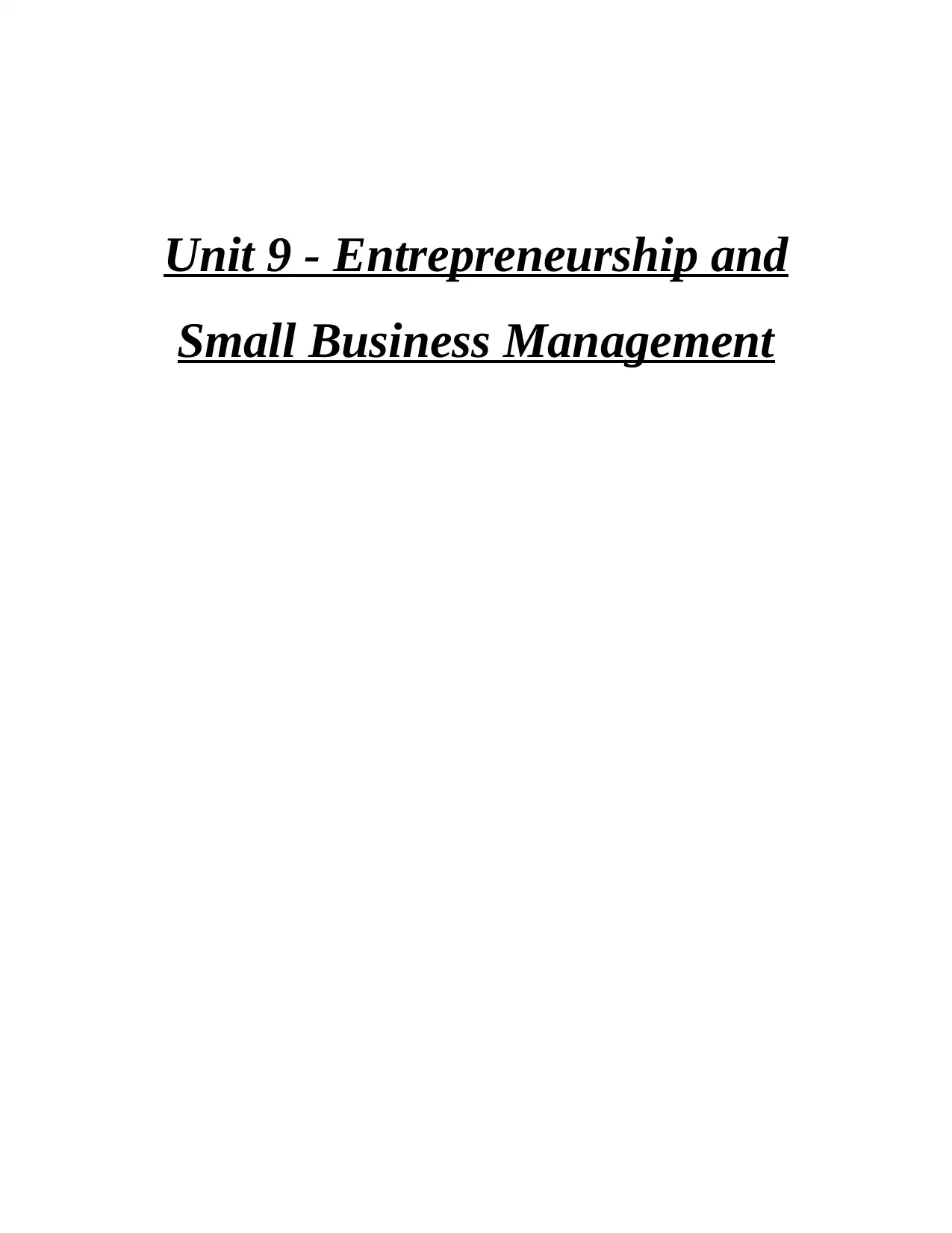
Unit 9 - Entrepreneurship and
Small Business Management
Small Business Management
Secure Best Marks with AI Grader
Need help grading? Try our AI Grader for instant feedback on your assignments.
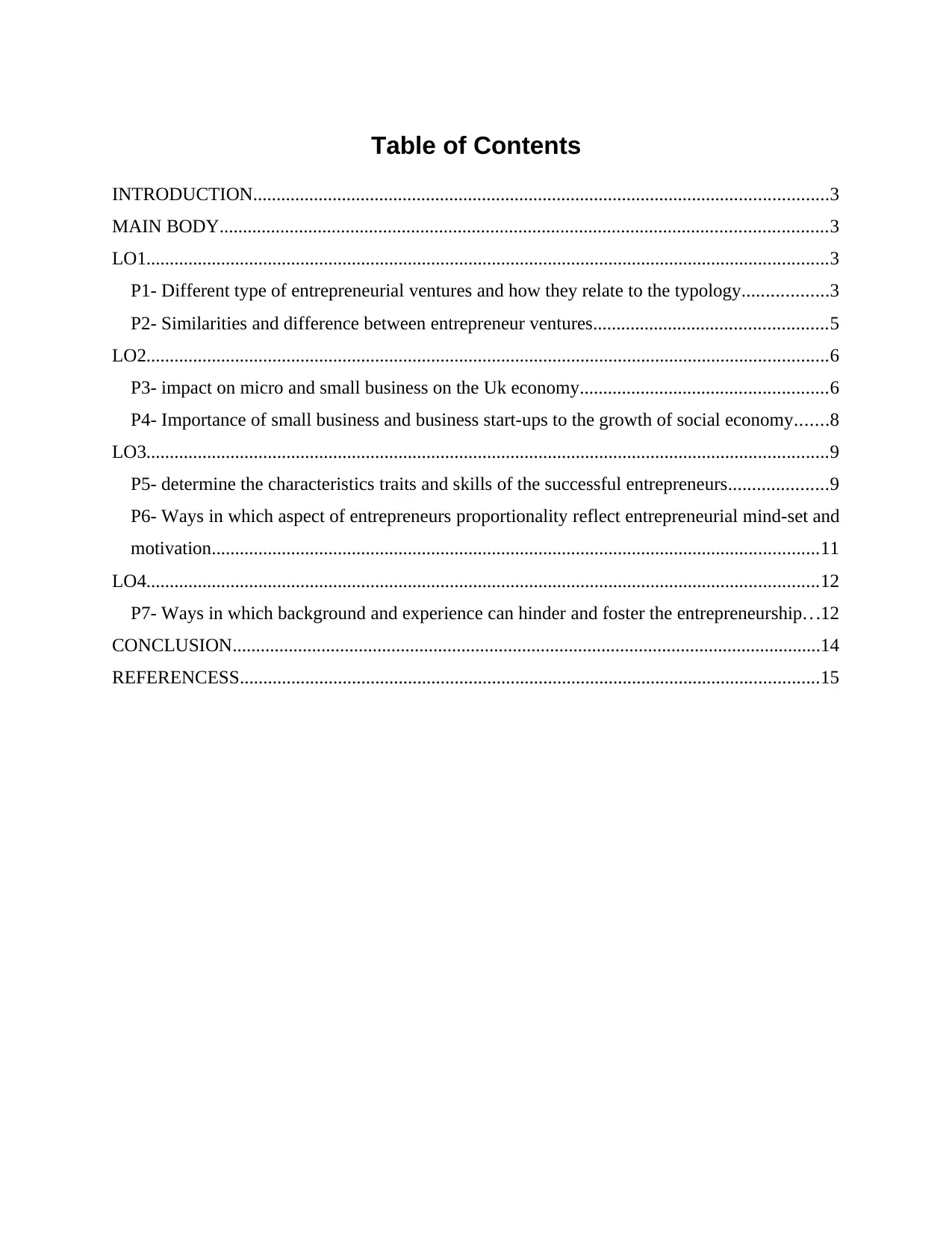
Table of Contents
INTRODUCTION...........................................................................................................................3
MAIN BODY..................................................................................................................................3
LO1..................................................................................................................................................3
P1- Different type of entrepreneurial ventures and how they relate to the typology..................3
P2- Similarities and difference between entrepreneur ventures..................................................5
LO2..................................................................................................................................................6
P3- impact on micro and small business on the Uk economy.....................................................6
P4- Importance of small business and business start-ups to the growth of social economy.......8
LO3..................................................................................................................................................9
P5- determine the characteristics traits and skills of the successful entrepreneurs.....................9
P6- Ways in which aspect of entrepreneurs proportionality reflect entrepreneurial mind-set and
motivation..................................................................................................................................11
LO4................................................................................................................................................12
P7- Ways in which background and experience can hinder and foster the entrepreneurship. . .12
CONCLUSION..............................................................................................................................14
REFERENCESS............................................................................................................................15
INTRODUCTION...........................................................................................................................3
MAIN BODY..................................................................................................................................3
LO1..................................................................................................................................................3
P1- Different type of entrepreneurial ventures and how they relate to the typology..................3
P2- Similarities and difference between entrepreneur ventures..................................................5
LO2..................................................................................................................................................6
P3- impact on micro and small business on the Uk economy.....................................................6
P4- Importance of small business and business start-ups to the growth of social economy.......8
LO3..................................................................................................................................................9
P5- determine the characteristics traits and skills of the successful entrepreneurs.....................9
P6- Ways in which aspect of entrepreneurs proportionality reflect entrepreneurial mind-set and
motivation..................................................................................................................................11
LO4................................................................................................................................................12
P7- Ways in which background and experience can hinder and foster the entrepreneurship. . .12
CONCLUSION..............................................................................................................................14
REFERENCESS............................................................................................................................15
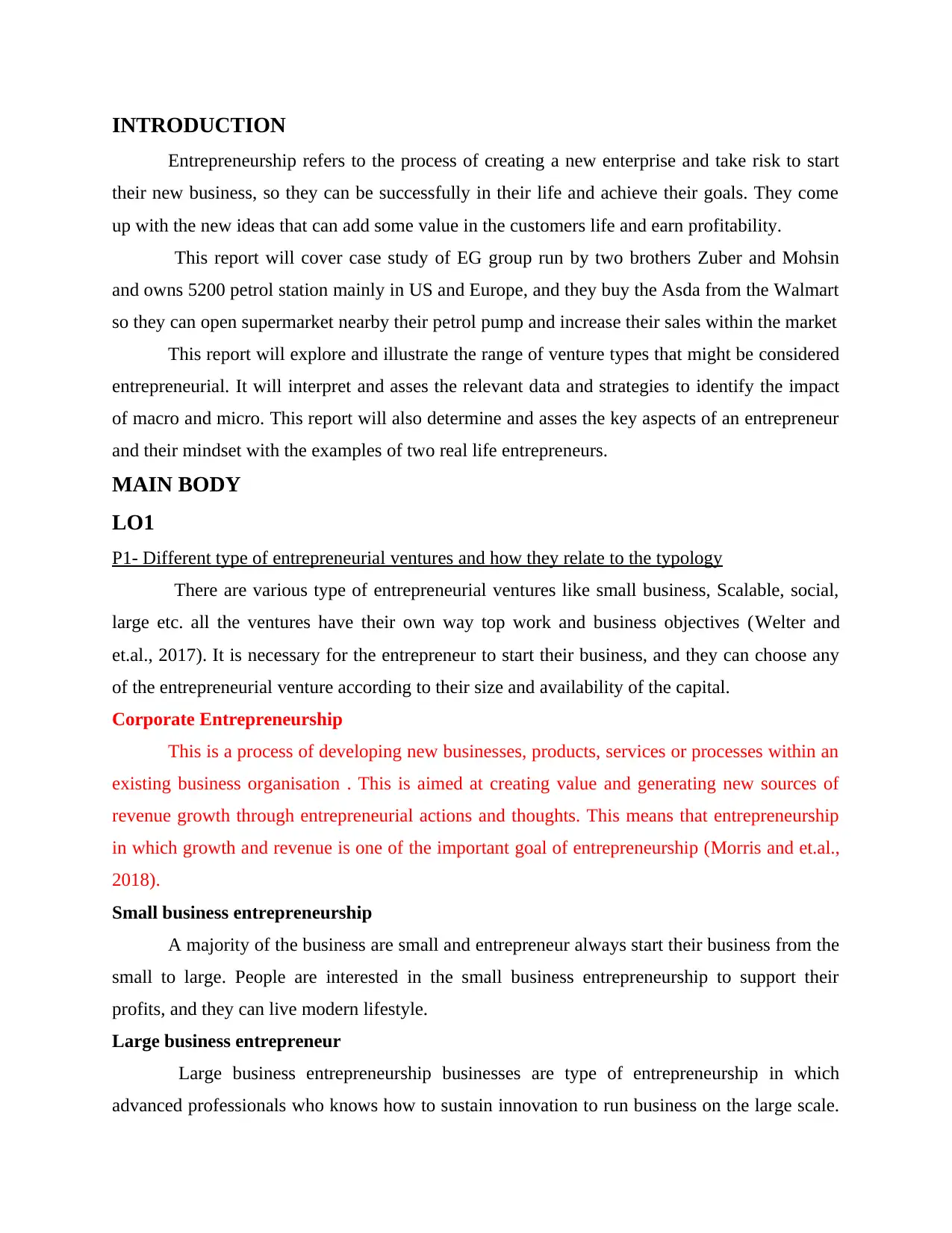
INTRODUCTION
Entrepreneurship refers to the process of creating a new enterprise and take risk to start
their new business, so they can be successfully in their life and achieve their goals. They come
up with the new ideas that can add some value in the customers life and earn profitability.
This report will cover case study of EG group run by two brothers Zuber and Mohsin
and owns 5200 petrol station mainly in US and Europe, and they buy the Asda from the Walmart
so they can open supermarket nearby their petrol pump and increase their sales within the market
This report will explore and illustrate the range of venture types that might be considered
entrepreneurial. It will interpret and asses the relevant data and strategies to identify the impact
of macro and micro. This report will also determine and asses the key aspects of an entrepreneur
and their mindset with the examples of two real life entrepreneurs.
MAIN BODY
LO1
P1- Different type of entrepreneurial ventures and how they relate to the typology
There are various type of entrepreneurial ventures like small business, Scalable, social,
large etc. all the ventures have their own way top work and business objectives (Welter and
et.al., 2017). It is necessary for the entrepreneur to start their business, and they can choose any
of the entrepreneurial venture according to their size and availability of the capital.
Corporate Entrepreneurship
This is a process of developing new businesses, products, services or processes within an
existing business organisation . This is aimed at creating value and generating new sources of
revenue growth through entrepreneurial actions and thoughts. This means that entrepreneurship
in which growth and revenue is one of the important goal of entrepreneurship (Morris and et.al.,
2018).
Small business entrepreneurship
A majority of the business are small and entrepreneur always start their business from the
small to large. People are interested in the small business entrepreneurship to support their
profits, and they can live modern lifestyle.
Large business entrepreneur
Large business entrepreneurship businesses are type of entrepreneurship in which
advanced professionals who knows how to sustain innovation to run business on the large scale.
Entrepreneurship refers to the process of creating a new enterprise and take risk to start
their new business, so they can be successfully in their life and achieve their goals. They come
up with the new ideas that can add some value in the customers life and earn profitability.
This report will cover case study of EG group run by two brothers Zuber and Mohsin
and owns 5200 petrol station mainly in US and Europe, and they buy the Asda from the Walmart
so they can open supermarket nearby their petrol pump and increase their sales within the market
This report will explore and illustrate the range of venture types that might be considered
entrepreneurial. It will interpret and asses the relevant data and strategies to identify the impact
of macro and micro. This report will also determine and asses the key aspects of an entrepreneur
and their mindset with the examples of two real life entrepreneurs.
MAIN BODY
LO1
P1- Different type of entrepreneurial ventures and how they relate to the typology
There are various type of entrepreneurial ventures like small business, Scalable, social,
large etc. all the ventures have their own way top work and business objectives (Welter and
et.al., 2017). It is necessary for the entrepreneur to start their business, and they can choose any
of the entrepreneurial venture according to their size and availability of the capital.
Corporate Entrepreneurship
This is a process of developing new businesses, products, services or processes within an
existing business organisation . This is aimed at creating value and generating new sources of
revenue growth through entrepreneurial actions and thoughts. This means that entrepreneurship
in which growth and revenue is one of the important goal of entrepreneurship (Morris and et.al.,
2018).
Small business entrepreneurship
A majority of the business are small and entrepreneur always start their business from the
small to large. People are interested in the small business entrepreneurship to support their
profits, and they can live modern lifestyle.
Large business entrepreneur
Large business entrepreneurship businesses are type of entrepreneurship in which
advanced professionals who knows how to sustain innovation to run business on the large scale.
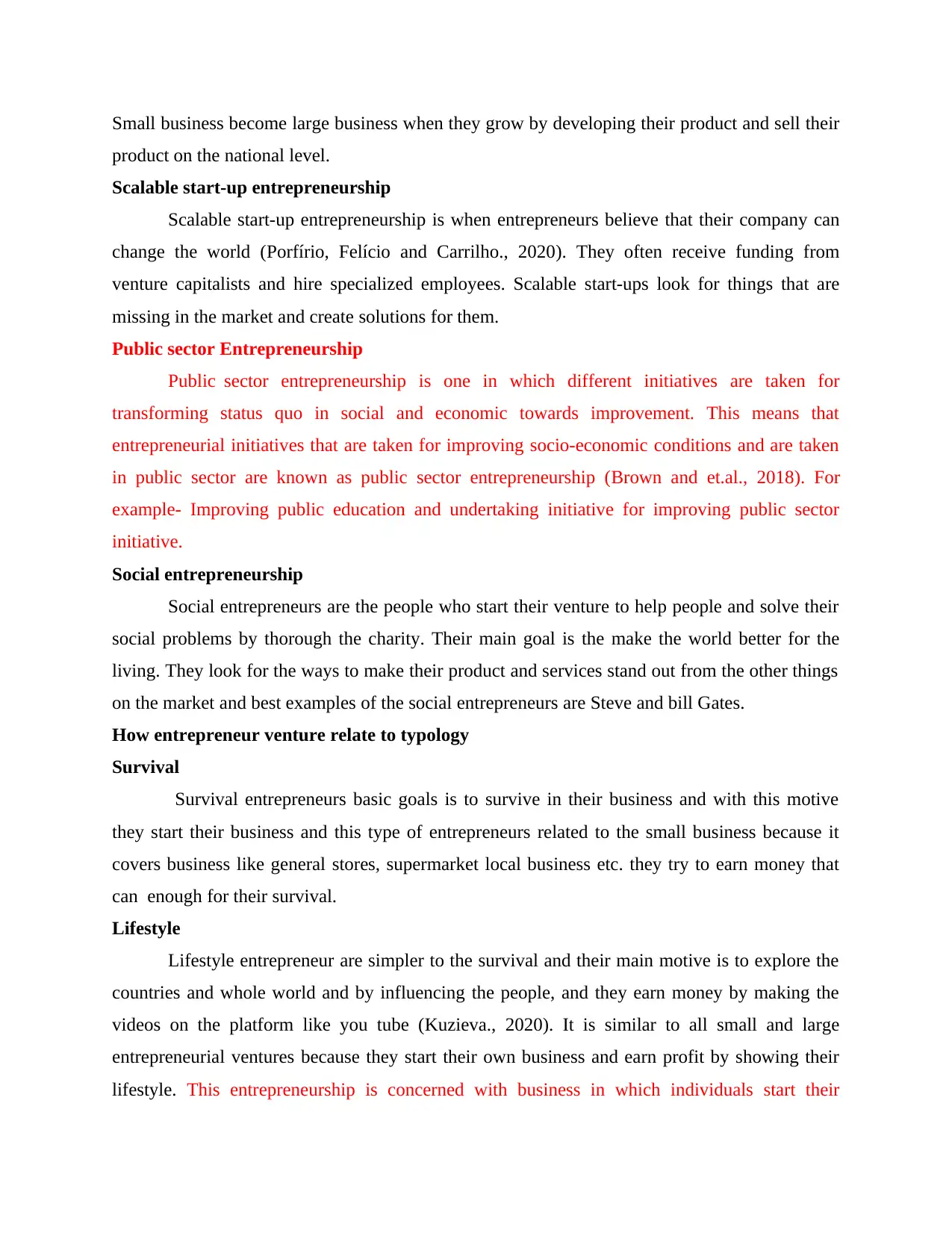
Small business become large business when they grow by developing their product and sell their
product on the national level.
Scalable start-up entrepreneurship
Scalable start-up entrepreneurship is when entrepreneurs believe that their company can
change the world (Porfírio, Felício and Carrilho., 2020). They often receive funding from
venture capitalists and hire specialized employees. Scalable start-ups look for things that are
missing in the market and create solutions for them.
Public sector Entrepreneurship
Public sector entrepreneurship is one in which different initiatives are taken for
transforming status quo in social and economic towards improvement. This means that
entrepreneurial initiatives that are taken for improving socio-economic conditions and are taken
in public sector are known as public sector entrepreneurship (Brown and et.al., 2018). For
example- Improving public education and undertaking initiative for improving public sector
initiative.
Social entrepreneurship
Social entrepreneurs are the people who start their venture to help people and solve their
social problems by thorough the charity. Their main goal is the make the world better for the
living. They look for the ways to make their product and services stand out from the other things
on the market and best examples of the social entrepreneurs are Steve and bill Gates.
How entrepreneur venture relate to typology
Survival
Survival entrepreneurs basic goals is to survive in their business and with this motive
they start their business and this type of entrepreneurs related to the small business because it
covers business like general stores, supermarket local business etc. they try to earn money that
can enough for their survival.
Lifestyle
Lifestyle entrepreneur are simpler to the survival and their main motive is to explore the
countries and whole world and by influencing the people, and they earn money by making the
videos on the platform like you tube (Kuzieva., 2020). It is similar to all small and large
entrepreneurial ventures because they start their own business and earn profit by showing their
lifestyle. This entrepreneurship is concerned with business in which individuals start their
product on the national level.
Scalable start-up entrepreneurship
Scalable start-up entrepreneurship is when entrepreneurs believe that their company can
change the world (Porfírio, Felício and Carrilho., 2020). They often receive funding from
venture capitalists and hire specialized employees. Scalable start-ups look for things that are
missing in the market and create solutions for them.
Public sector Entrepreneurship
Public sector entrepreneurship is one in which different initiatives are taken for
transforming status quo in social and economic towards improvement. This means that
entrepreneurial initiatives that are taken for improving socio-economic conditions and are taken
in public sector are known as public sector entrepreneurship (Brown and et.al., 2018). For
example- Improving public education and undertaking initiative for improving public sector
initiative.
Social entrepreneurship
Social entrepreneurs are the people who start their venture to help people and solve their
social problems by thorough the charity. Their main goal is the make the world better for the
living. They look for the ways to make their product and services stand out from the other things
on the market and best examples of the social entrepreneurs are Steve and bill Gates.
How entrepreneur venture relate to typology
Survival
Survival entrepreneurs basic goals is to survive in their business and with this motive
they start their business and this type of entrepreneurs related to the small business because it
covers business like general stores, supermarket local business etc. they try to earn money that
can enough for their survival.
Lifestyle
Lifestyle entrepreneur are simpler to the survival and their main motive is to explore the
countries and whole world and by influencing the people, and they earn money by making the
videos on the platform like you tube (Kuzieva., 2020). It is similar to all small and large
entrepreneurial ventures because they start their own business and earn profit by showing their
lifestyle. This entrepreneurship is concerned with business in which individuals start their
Secure Best Marks with AI Grader
Need help grading? Try our AI Grader for instant feedback on your assignments.
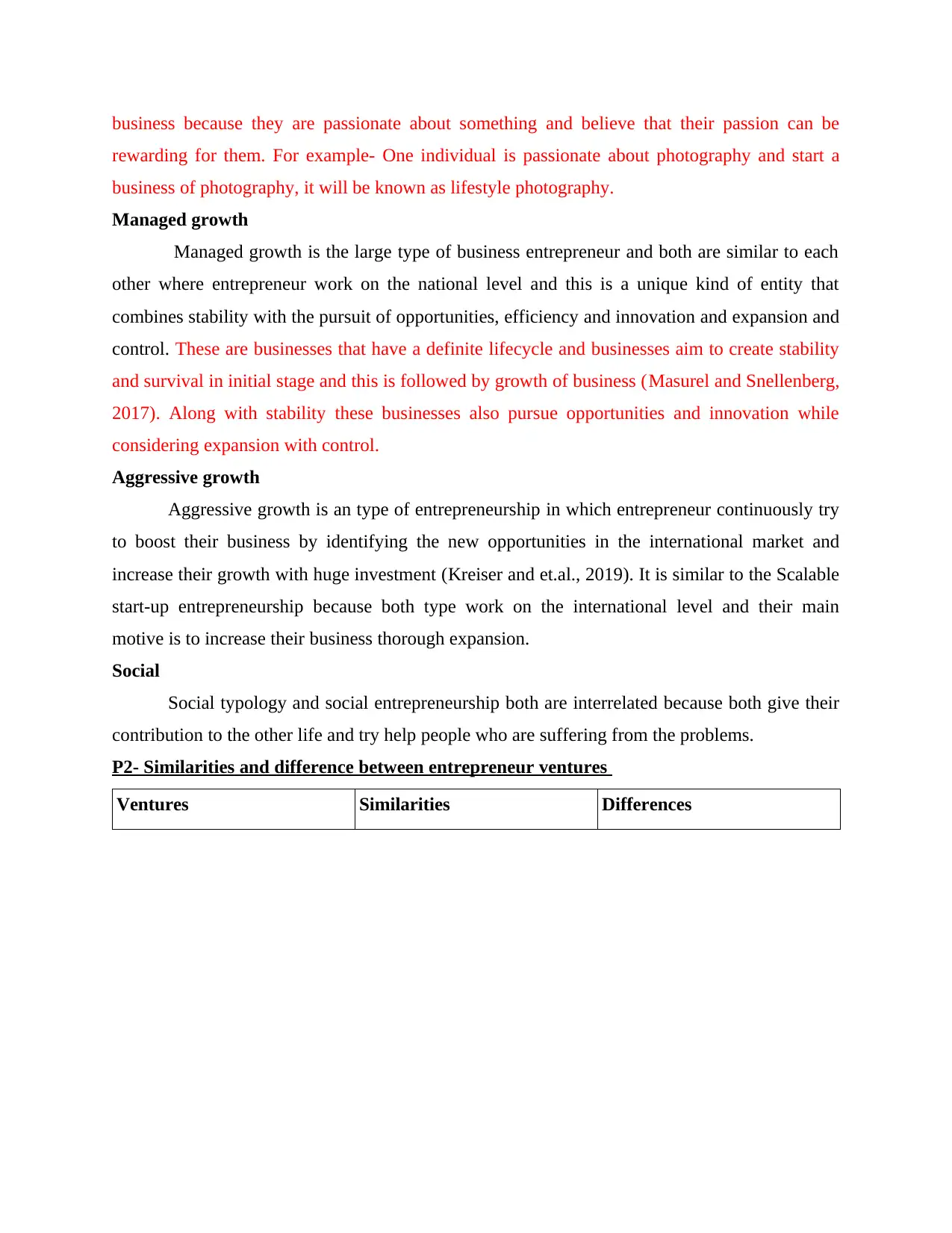
business because they are passionate about something and believe that their passion can be
rewarding for them. For example- One individual is passionate about photography and start a
business of photography, it will be known as lifestyle photography.
Managed growth
Managed growth is the large type of business entrepreneur and both are similar to each
other where entrepreneur work on the national level and this is a unique kind of entity that
combines stability with the pursuit of opportunities, efficiency and innovation and expansion and
control. These are businesses that have a definite lifecycle and businesses aim to create stability
and survival in initial stage and this is followed by growth of business (Masurel and Snellenberg,
2017). Along with stability these businesses also pursue opportunities and innovation while
considering expansion with control.
Aggressive growth
Aggressive growth is an type of entrepreneurship in which entrepreneur continuously try
to boost their business by identifying the new opportunities in the international market and
increase their growth with huge investment (Kreiser and et.al., 2019). It is similar to the Scalable
start-up entrepreneurship because both type work on the international level and their main
motive is to increase their business thorough expansion.
Social
Social typology and social entrepreneurship both are interrelated because both give their
contribution to the other life and try help people who are suffering from the problems.
P2- Similarities and difference between entrepreneur ventures
Ventures Similarities Differences
rewarding for them. For example- One individual is passionate about photography and start a
business of photography, it will be known as lifestyle photography.
Managed growth
Managed growth is the large type of business entrepreneur and both are similar to each
other where entrepreneur work on the national level and this is a unique kind of entity that
combines stability with the pursuit of opportunities, efficiency and innovation and expansion and
control. These are businesses that have a definite lifecycle and businesses aim to create stability
and survival in initial stage and this is followed by growth of business (Masurel and Snellenberg,
2017). Along with stability these businesses also pursue opportunities and innovation while
considering expansion with control.
Aggressive growth
Aggressive growth is an type of entrepreneurship in which entrepreneur continuously try
to boost their business by identifying the new opportunities in the international market and
increase their growth with huge investment (Kreiser and et.al., 2019). It is similar to the Scalable
start-up entrepreneurship because both type work on the international level and their main
motive is to increase their business thorough expansion.
Social
Social typology and social entrepreneurship both are interrelated because both give their
contribution to the other life and try help people who are suffering from the problems.
P2- Similarities and difference between entrepreneur ventures
Ventures Similarities Differences
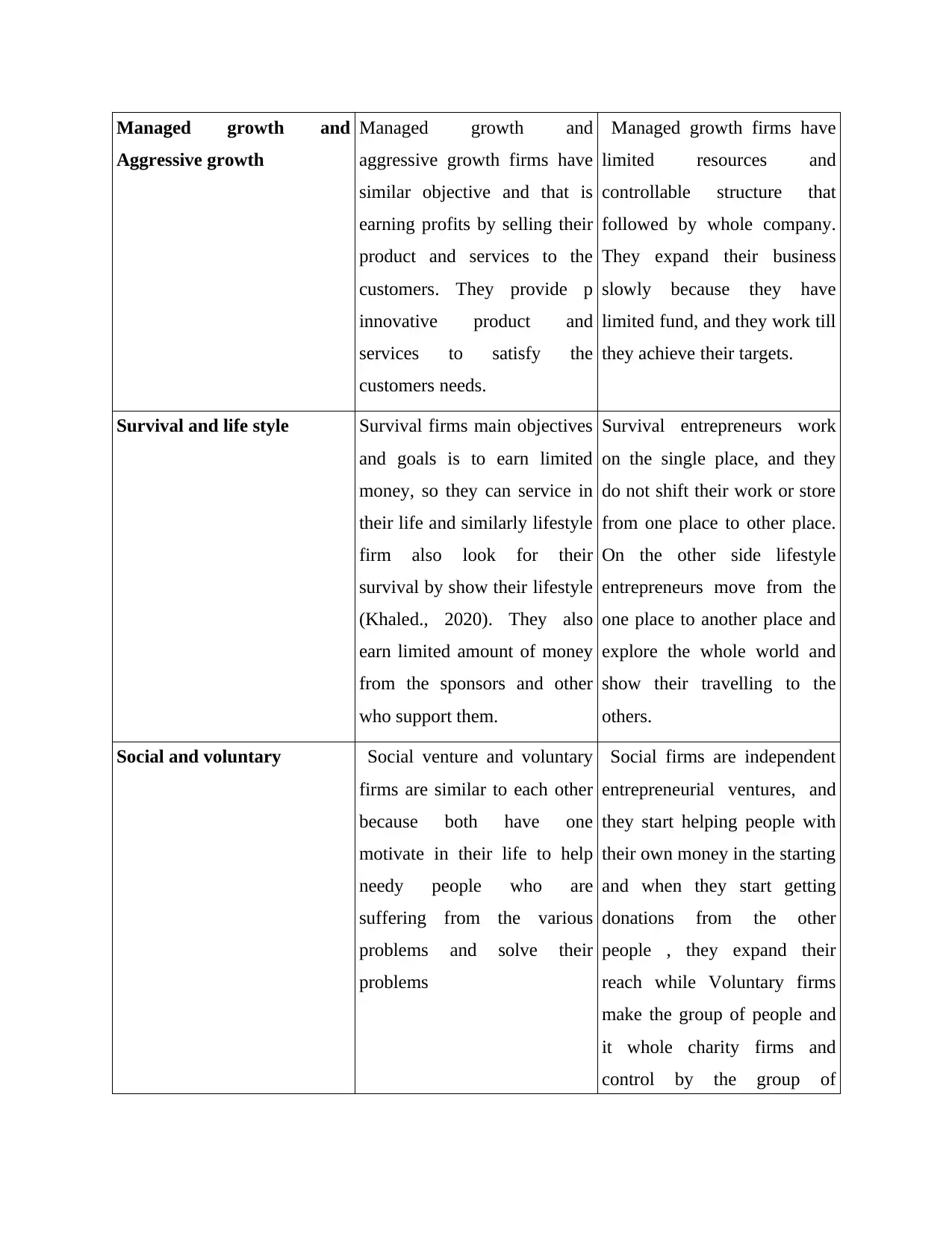
Managed growth and
Aggressive growth
Managed growth and
aggressive growth firms have
similar objective and that is
earning profits by selling their
product and services to the
customers. They provide p
innovative product and
services to satisfy the
customers needs.
Managed growth firms have
limited resources and
controllable structure that
followed by whole company.
They expand their business
slowly because they have
limited fund, and they work till
they achieve their targets.
Survival and life style Survival firms main objectives
and goals is to earn limited
money, so they can service in
their life and similarly lifestyle
firm also look for their
survival by show their lifestyle
(Khaled., 2020). They also
earn limited amount of money
from the sponsors and other
who support them.
Survival entrepreneurs work
on the single place, and they
do not shift their work or store
from one place to other place.
On the other side lifestyle
entrepreneurs move from the
one place to another place and
explore the whole world and
show their travelling to the
others.
Social and voluntary Social venture and voluntary
firms are similar to each other
because both have one
motivate in their life to help
needy people who are
suffering from the various
problems and solve their
problems
Social firms are independent
entrepreneurial ventures, and
they start helping people with
their own money in the starting
and when they start getting
donations from the other
people , they expand their
reach while Voluntary firms
make the group of people and
it whole charity firms and
control by the group of
Aggressive growth
Managed growth and
aggressive growth firms have
similar objective and that is
earning profits by selling their
product and services to the
customers. They provide p
innovative product and
services to satisfy the
customers needs.
Managed growth firms have
limited resources and
controllable structure that
followed by whole company.
They expand their business
slowly because they have
limited fund, and they work till
they achieve their targets.
Survival and life style Survival firms main objectives
and goals is to earn limited
money, so they can service in
their life and similarly lifestyle
firm also look for their
survival by show their lifestyle
(Khaled., 2020). They also
earn limited amount of money
from the sponsors and other
who support them.
Survival entrepreneurs work
on the single place, and they
do not shift their work or store
from one place to other place.
On the other side lifestyle
entrepreneurs move from the
one place to another place and
explore the whole world and
show their travelling to the
others.
Social and voluntary Social venture and voluntary
firms are similar to each other
because both have one
motivate in their life to help
needy people who are
suffering from the various
problems and solve their
problems
Social firms are independent
entrepreneurial ventures, and
they start helping people with
their own money in the starting
and when they start getting
donations from the other
people , they expand their
reach while Voluntary firms
make the group of people and
it whole charity firms and
control by the group of
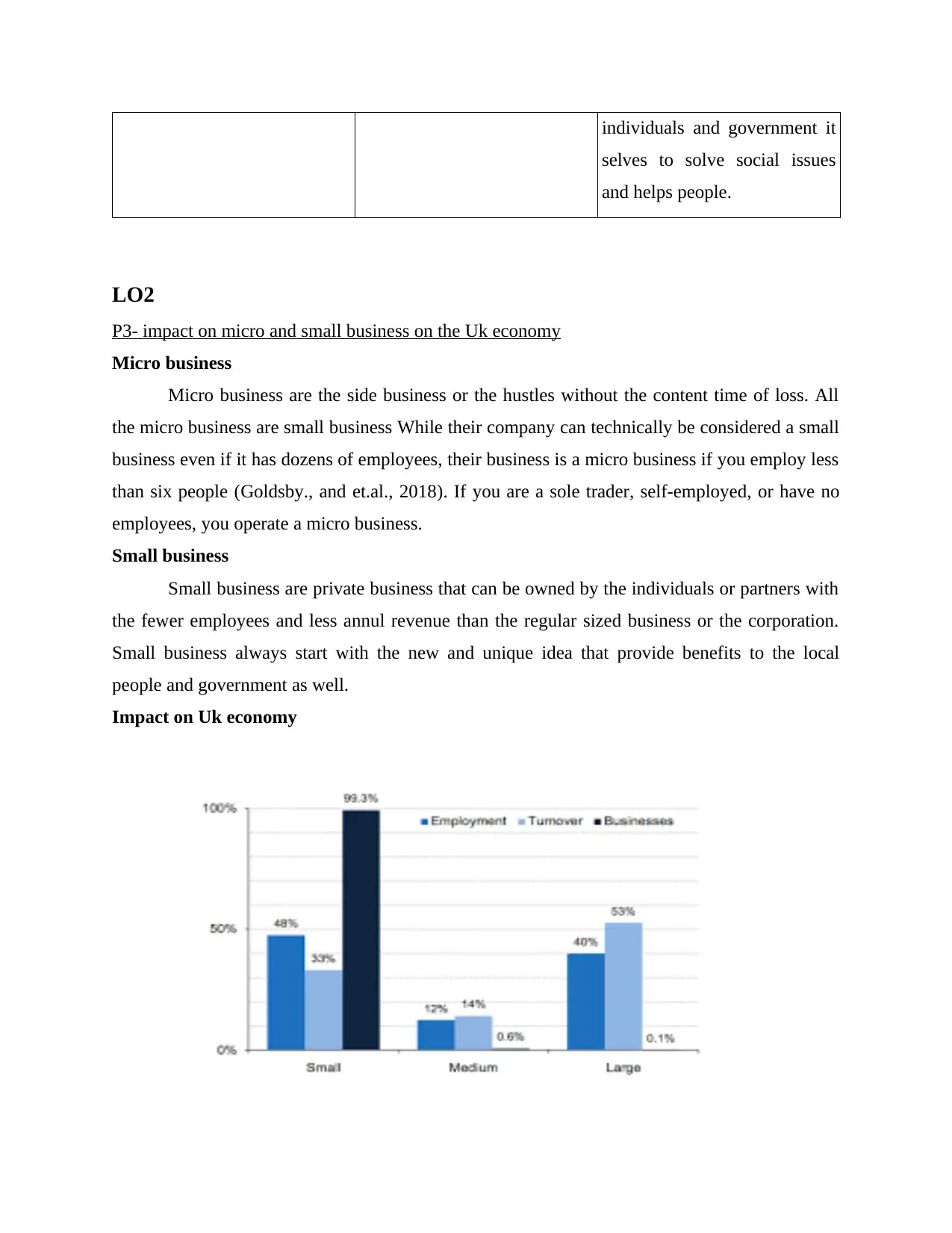
individuals and government it
selves to solve social issues
and helps people.
LO2
P3- impact on micro and small business on the Uk economy
Micro business
Micro business are the side business or the hustles without the content time of loss. All
the micro business are small business While their company can technically be considered a small
business even if it has dozens of employees, their business is a micro business if you employ less
than six people (Goldsby., and et.al., 2018). If you are a sole trader, self-employed, or have no
employees, you operate a micro business.
Small business
Small business are private business that can be owned by the individuals or partners with
the fewer employees and less annul revenue than the regular sized business or the corporation.
Small business always start with the new and unique idea that provide benefits to the local
people and government as well.
Impact on Uk economy
selves to solve social issues
and helps people.
LO2
P3- impact on micro and small business on the Uk economy
Micro business
Micro business are the side business or the hustles without the content time of loss. All
the micro business are small business While their company can technically be considered a small
business even if it has dozens of employees, their business is a micro business if you employ less
than six people (Goldsby., and et.al., 2018). If you are a sole trader, self-employed, or have no
employees, you operate a micro business.
Small business
Small business are private business that can be owned by the individuals or partners with
the fewer employees and less annul revenue than the regular sized business or the corporation.
Small business always start with the new and unique idea that provide benefits to the local
people and government as well.
Impact on Uk economy
Paraphrase This Document
Need a fresh take? Get an instant paraphrase of this document with our AI Paraphraser
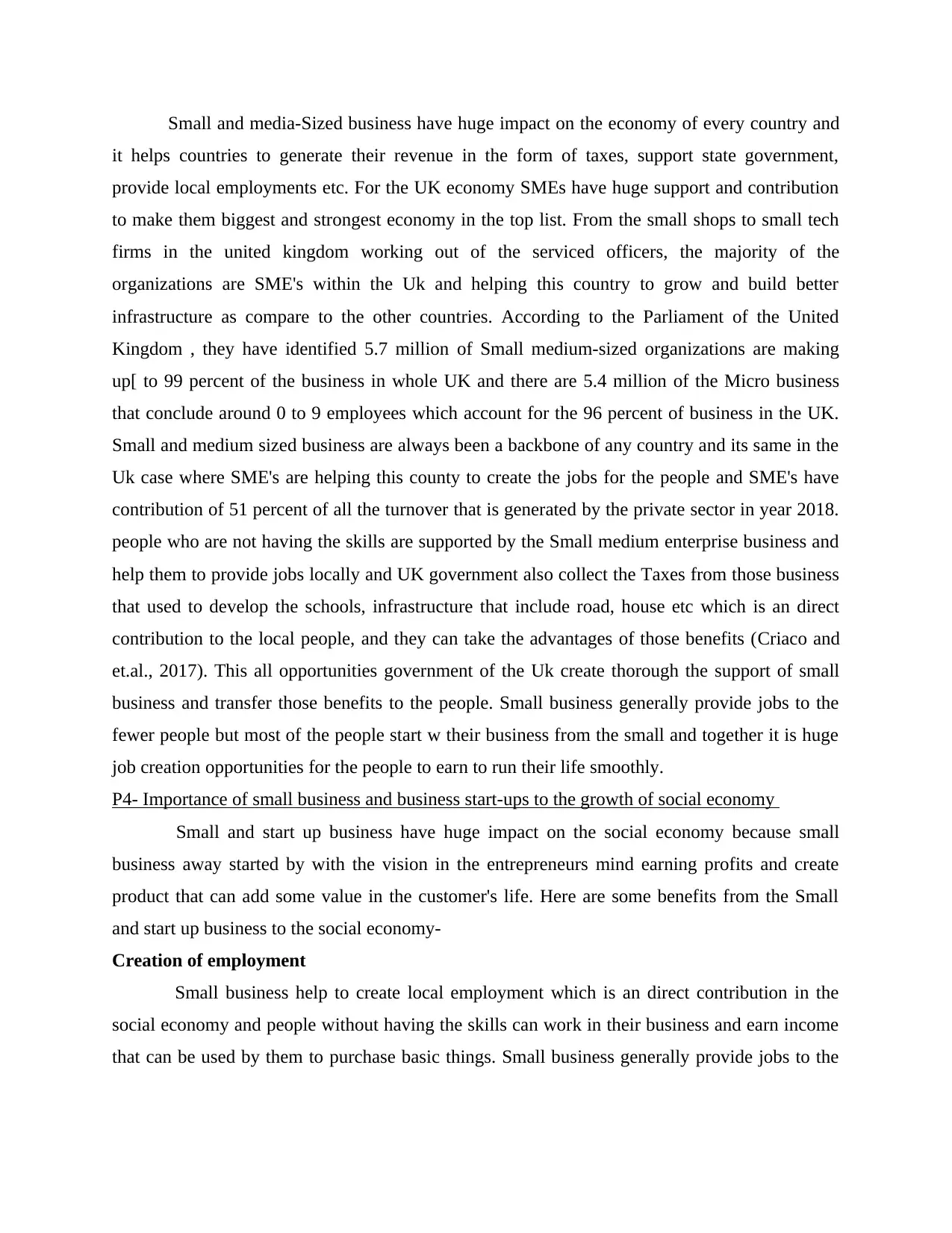
Small and media-Sized business have huge impact on the economy of every country and
it helps countries to generate their revenue in the form of taxes, support state government,
provide local employments etc. For the UK economy SMEs have huge support and contribution
to make them biggest and strongest economy in the top list. From the small shops to small tech
firms in the united kingdom working out of the serviced officers, the majority of the
organizations are SME's within the Uk and helping this country to grow and build better
infrastructure as compare to the other countries. According to the Parliament of the United
Kingdom , they have identified 5.7 million of Small medium-sized organizations are making
up[ to 99 percent of the business in whole UK and there are 5.4 million of the Micro business
that conclude around 0 to 9 employees which account for the 96 percent of business in the UK.
Small and medium sized business are always been a backbone of any country and its same in the
Uk case where SME's are helping this county to create the jobs for the people and SME's have
contribution of 51 percent of all the turnover that is generated by the private sector in year 2018.
people who are not having the skills are supported by the Small medium enterprise business and
help them to provide jobs locally and UK government also collect the Taxes from those business
that used to develop the schools, infrastructure that include road, house etc which is an direct
contribution to the local people, and they can take the advantages of those benefits (Criaco and
et.al., 2017). This all opportunities government of the Uk create thorough the support of small
business and transfer those benefits to the people. Small business generally provide jobs to the
fewer people but most of the people start w their business from the small and together it is huge
job creation opportunities for the people to earn to run their life smoothly.
P4- Importance of small business and business start-ups to the growth of social economy
Small and start up business have huge impact on the social economy because small
business away started by with the vision in the entrepreneurs mind earning profits and create
product that can add some value in the customer's life. Here are some benefits from the Small
and start up business to the social economy-
Creation of employment
Small business help to create local employment which is an direct contribution in the
social economy and people without having the skills can work in their business and earn income
that can be used by them to purchase basic things. Small business generally provide jobs to the
it helps countries to generate their revenue in the form of taxes, support state government,
provide local employments etc. For the UK economy SMEs have huge support and contribution
to make them biggest and strongest economy in the top list. From the small shops to small tech
firms in the united kingdom working out of the serviced officers, the majority of the
organizations are SME's within the Uk and helping this country to grow and build better
infrastructure as compare to the other countries. According to the Parliament of the United
Kingdom , they have identified 5.7 million of Small medium-sized organizations are making
up[ to 99 percent of the business in whole UK and there are 5.4 million of the Micro business
that conclude around 0 to 9 employees which account for the 96 percent of business in the UK.
Small and medium sized business are always been a backbone of any country and its same in the
Uk case where SME's are helping this county to create the jobs for the people and SME's have
contribution of 51 percent of all the turnover that is generated by the private sector in year 2018.
people who are not having the skills are supported by the Small medium enterprise business and
help them to provide jobs locally and UK government also collect the Taxes from those business
that used to develop the schools, infrastructure that include road, house etc which is an direct
contribution to the local people, and they can take the advantages of those benefits (Criaco and
et.al., 2017). This all opportunities government of the Uk create thorough the support of small
business and transfer those benefits to the people. Small business generally provide jobs to the
fewer people but most of the people start w their business from the small and together it is huge
job creation opportunities for the people to earn to run their life smoothly.
P4- Importance of small business and business start-ups to the growth of social economy
Small and start up business have huge impact on the social economy because small
business away started by with the vision in the entrepreneurs mind earning profits and create
product that can add some value in the customer's life. Here are some benefits from the Small
and start up business to the social economy-
Creation of employment
Small business help to create local employment which is an direct contribution in the
social economy and people without having the skills can work in their business and earn income
that can be used by them to purchase basic things. Small business generally provide jobs to the
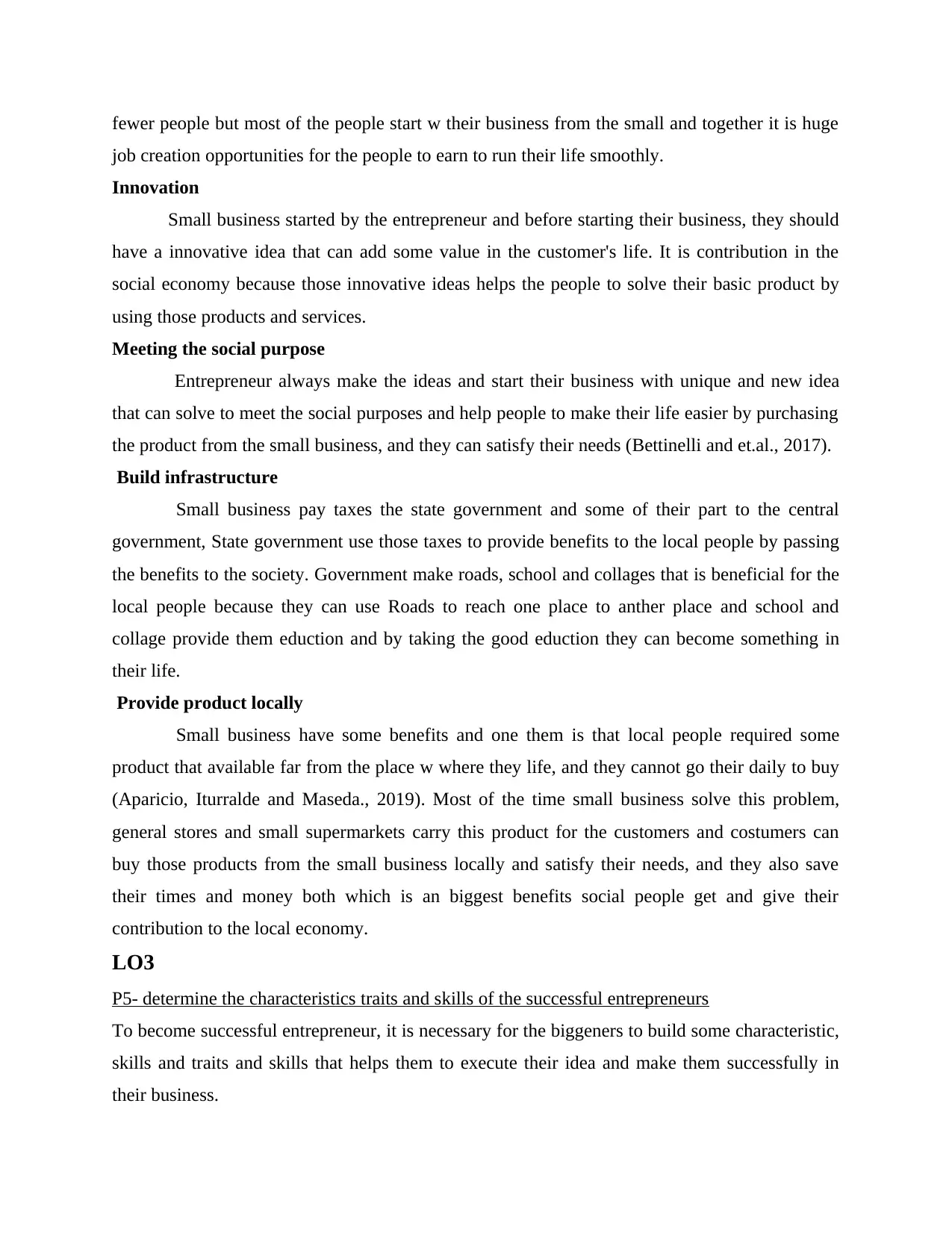
fewer people but most of the people start w their business from the small and together it is huge
job creation opportunities for the people to earn to run their life smoothly.
Innovation
Small business started by the entrepreneur and before starting their business, they should
have a innovative idea that can add some value in the customer's life. It is contribution in the
social economy because those innovative ideas helps the people to solve their basic product by
using those products and services.
Meeting the social purpose
Entrepreneur always make the ideas and start their business with unique and new idea
that can solve to meet the social purposes and help people to make their life easier by purchasing
the product from the small business, and they can satisfy their needs (Bettinelli and et.al., 2017).
Build infrastructure
Small business pay taxes the state government and some of their part to the central
government, State government use those taxes to provide benefits to the local people by passing
the benefits to the society. Government make roads, school and collages that is beneficial for the
local people because they can use Roads to reach one place to anther place and school and
collage provide them eduction and by taking the good eduction they can become something in
their life.
Provide product locally
Small business have some benefits and one them is that local people required some
product that available far from the place w where they life, and they cannot go their daily to buy
(Aparicio, Iturralde and Maseda., 2019). Most of the time small business solve this problem,
general stores and small supermarkets carry this product for the customers and costumers can
buy those products from the small business locally and satisfy their needs, and they also save
their times and money both which is an biggest benefits social people get and give their
contribution to the local economy.
LO3
P5- determine the characteristics traits and skills of the successful entrepreneurs
To become successful entrepreneur, it is necessary for the biggeners to build some characteristic,
skills and traits and skills that helps them to execute their idea and make them successfully in
their business.
job creation opportunities for the people to earn to run their life smoothly.
Innovation
Small business started by the entrepreneur and before starting their business, they should
have a innovative idea that can add some value in the customer's life. It is contribution in the
social economy because those innovative ideas helps the people to solve their basic product by
using those products and services.
Meeting the social purpose
Entrepreneur always make the ideas and start their business with unique and new idea
that can solve to meet the social purposes and help people to make their life easier by purchasing
the product from the small business, and they can satisfy their needs (Bettinelli and et.al., 2017).
Build infrastructure
Small business pay taxes the state government and some of their part to the central
government, State government use those taxes to provide benefits to the local people by passing
the benefits to the society. Government make roads, school and collages that is beneficial for the
local people because they can use Roads to reach one place to anther place and school and
collage provide them eduction and by taking the good eduction they can become something in
their life.
Provide product locally
Small business have some benefits and one them is that local people required some
product that available far from the place w where they life, and they cannot go their daily to buy
(Aparicio, Iturralde and Maseda., 2019). Most of the time small business solve this problem,
general stores and small supermarkets carry this product for the customers and costumers can
buy those products from the small business locally and satisfy their needs, and they also save
their times and money both which is an biggest benefits social people get and give their
contribution to the local economy.
LO3
P5- determine the characteristics traits and skills of the successful entrepreneurs
To become successful entrepreneur, it is necessary for the biggeners to build some characteristic,
skills and traits and skills that helps them to execute their idea and make them successfully in
their business.
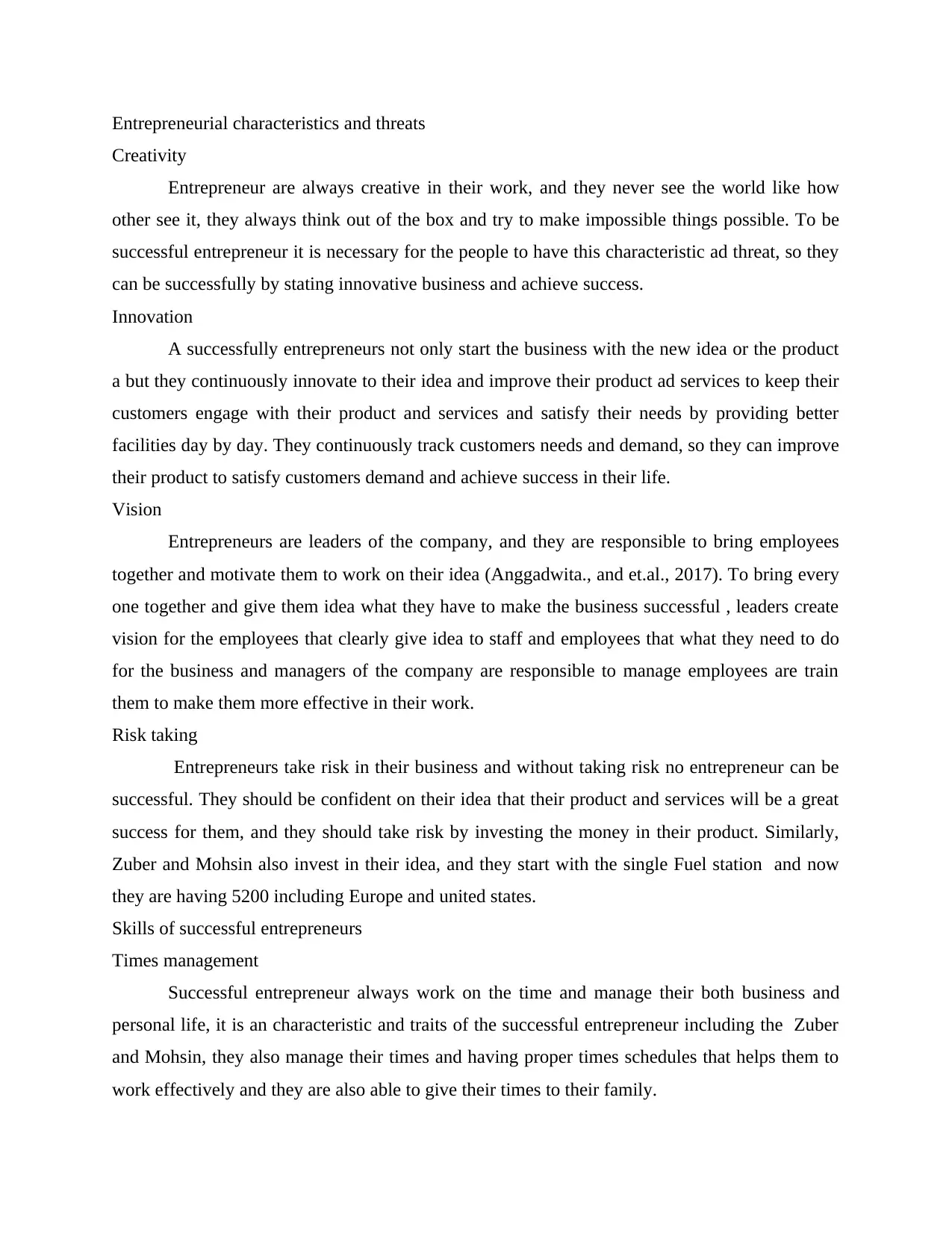
Entrepreneurial characteristics and threats
Creativity
Entrepreneur are always creative in their work, and they never see the world like how
other see it, they always think out of the box and try to make impossible things possible. To be
successful entrepreneur it is necessary for the people to have this characteristic ad threat, so they
can be successfully by stating innovative business and achieve success.
Innovation
A successfully entrepreneurs not only start the business with the new idea or the product
a but they continuously innovate to their idea and improve their product ad services to keep their
customers engage with their product and services and satisfy their needs by providing better
facilities day by day. They continuously track customers needs and demand, so they can improve
their product to satisfy customers demand and achieve success in their life.
Vision
Entrepreneurs are leaders of the company, and they are responsible to bring employees
together and motivate them to work on their idea (Anggadwita., and et.al., 2017). To bring every
one together and give them idea what they have to make the business successful , leaders create
vision for the employees that clearly give idea to staff and employees that what they need to do
for the business and managers of the company are responsible to manage employees are train
them to make them more effective in their work.
Risk taking
Entrepreneurs take risk in their business and without taking risk no entrepreneur can be
successful. They should be confident on their idea that their product and services will be a great
success for them, and they should take risk by investing the money in their product. Similarly,
Zuber and Mohsin also invest in their idea, and they start with the single Fuel station and now
they are having 5200 including Europe and united states.
Skills of successful entrepreneurs
Times management
Successful entrepreneur always work on the time and manage their both business and
personal life, it is an characteristic and traits of the successful entrepreneur including the Zuber
and Mohsin, they also manage their times and having proper times schedules that helps them to
work effectively and they are also able to give their times to their family.
Creativity
Entrepreneur are always creative in their work, and they never see the world like how
other see it, they always think out of the box and try to make impossible things possible. To be
successful entrepreneur it is necessary for the people to have this characteristic ad threat, so they
can be successfully by stating innovative business and achieve success.
Innovation
A successfully entrepreneurs not only start the business with the new idea or the product
a but they continuously innovate to their idea and improve their product ad services to keep their
customers engage with their product and services and satisfy their needs by providing better
facilities day by day. They continuously track customers needs and demand, so they can improve
their product to satisfy customers demand and achieve success in their life.
Vision
Entrepreneurs are leaders of the company, and they are responsible to bring employees
together and motivate them to work on their idea (Anggadwita., and et.al., 2017). To bring every
one together and give them idea what they have to make the business successful , leaders create
vision for the employees that clearly give idea to staff and employees that what they need to do
for the business and managers of the company are responsible to manage employees are train
them to make them more effective in their work.
Risk taking
Entrepreneurs take risk in their business and without taking risk no entrepreneur can be
successful. They should be confident on their idea that their product and services will be a great
success for them, and they should take risk by investing the money in their product. Similarly,
Zuber and Mohsin also invest in their idea, and they start with the single Fuel station and now
they are having 5200 including Europe and united states.
Skills of successful entrepreneurs
Times management
Successful entrepreneur always work on the time and manage their both business and
personal life, it is an characteristic and traits of the successful entrepreneur including the Zuber
and Mohsin, they also manage their times and having proper times schedules that helps them to
work effectively and they are also able to give their times to their family.
Secure Best Marks with AI Grader
Need help grading? Try our AI Grader for instant feedback on your assignments.
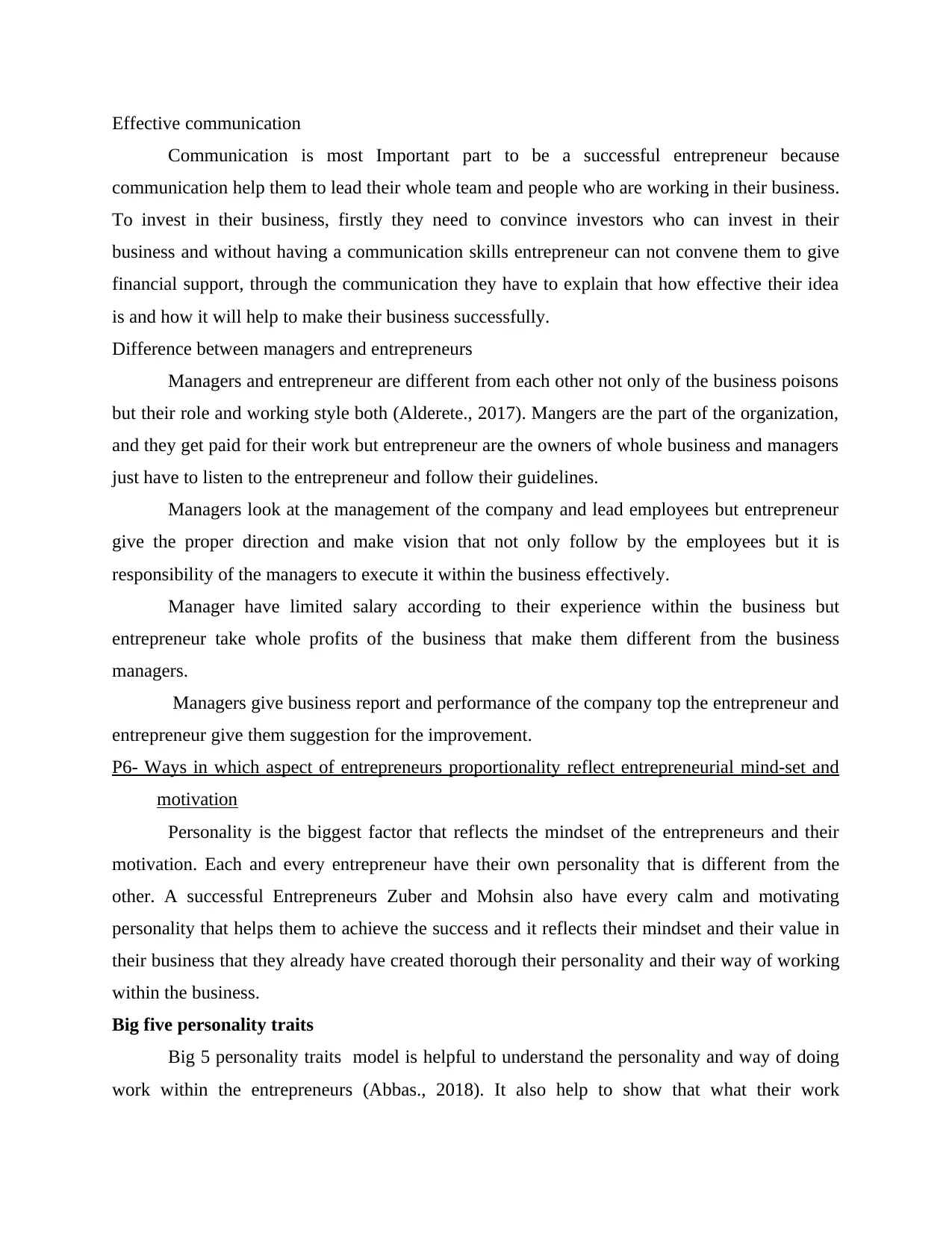
Effective communication
Communication is most Important part to be a successful entrepreneur because
communication help them to lead their whole team and people who are working in their business.
To invest in their business, firstly they need to convince investors who can invest in their
business and without having a communication skills entrepreneur can not convene them to give
financial support, through the communication they have to explain that how effective their idea
is and how it will help to make their business successfully.
Difference between managers and entrepreneurs
Managers and entrepreneur are different from each other not only of the business poisons
but their role and working style both (Alderete., 2017). Mangers are the part of the organization,
and they get paid for their work but entrepreneur are the owners of whole business and managers
just have to listen to the entrepreneur and follow their guidelines.
Managers look at the management of the company and lead employees but entrepreneur
give the proper direction and make vision that not only follow by the employees but it is
responsibility of the managers to execute it within the business effectively.
Manager have limited salary according to their experience within the business but
entrepreneur take whole profits of the business that make them different from the business
managers.
Managers give business report and performance of the company top the entrepreneur and
entrepreneur give them suggestion for the improvement.
P6- Ways in which aspect of entrepreneurs proportionality reflect entrepreneurial mind-set and
motivation
Personality is the biggest factor that reflects the mindset of the entrepreneurs and their
motivation. Each and every entrepreneur have their own personality that is different from the
other. A successful Entrepreneurs Zuber and Mohsin also have every calm and motivating
personality that helps them to achieve the success and it reflects their mindset and their value in
their business that they already have created thorough their personality and their way of working
within the business.
Big five personality traits
Big 5 personality traits model is helpful to understand the personality and way of doing
work within the entrepreneurs (Abbas., 2018). It also help to show that what their work
Communication is most Important part to be a successful entrepreneur because
communication help them to lead their whole team and people who are working in their business.
To invest in their business, firstly they need to convince investors who can invest in their
business and without having a communication skills entrepreneur can not convene them to give
financial support, through the communication they have to explain that how effective their idea
is and how it will help to make their business successfully.
Difference between managers and entrepreneurs
Managers and entrepreneur are different from each other not only of the business poisons
but their role and working style both (Alderete., 2017). Mangers are the part of the organization,
and they get paid for their work but entrepreneur are the owners of whole business and managers
just have to listen to the entrepreneur and follow their guidelines.
Managers look at the management of the company and lead employees but entrepreneur
give the proper direction and make vision that not only follow by the employees but it is
responsibility of the managers to execute it within the business effectively.
Manager have limited salary according to their experience within the business but
entrepreneur take whole profits of the business that make them different from the business
managers.
Managers give business report and performance of the company top the entrepreneur and
entrepreneur give them suggestion for the improvement.
P6- Ways in which aspect of entrepreneurs proportionality reflect entrepreneurial mind-set and
motivation
Personality is the biggest factor that reflects the mindset of the entrepreneurs and their
motivation. Each and every entrepreneur have their own personality that is different from the
other. A successful Entrepreneurs Zuber and Mohsin also have every calm and motivating
personality that helps them to achieve the success and it reflects their mindset and their value in
their business that they already have created thorough their personality and their way of working
within the business.
Big five personality traits
Big 5 personality traits model is helpful to understand the personality and way of doing
work within the entrepreneurs (Abbas., 2018). It also help to show that what their work
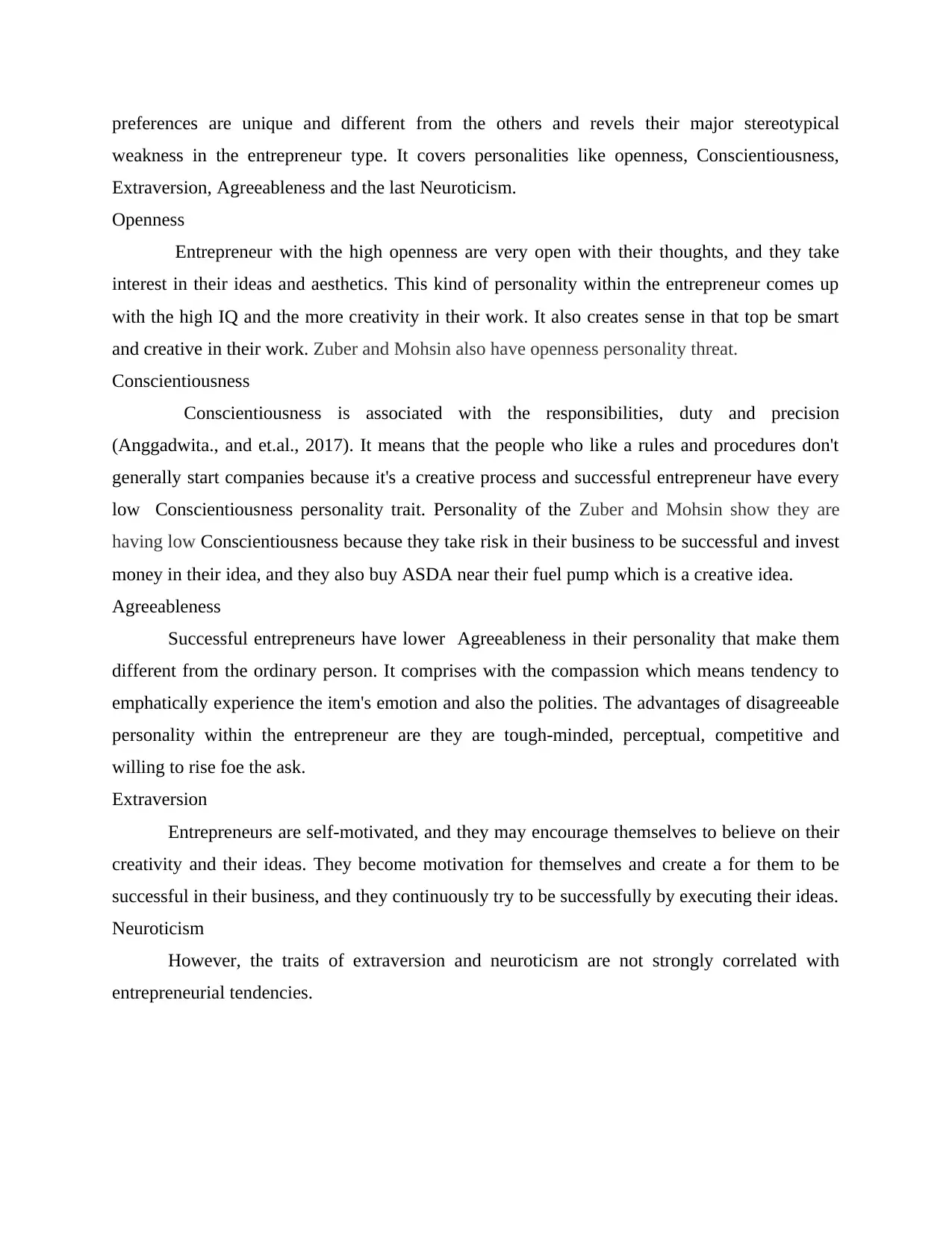
preferences are unique and different from the others and revels their major stereotypical
weakness in the entrepreneur type. It covers personalities like openness, Conscientiousness,
Extraversion, Agreeableness and the last Neuroticism.
Openness
Entrepreneur with the high openness are very open with their thoughts, and they take
interest in their ideas and aesthetics. This kind of personality within the entrepreneur comes up
with the high IQ and the more creativity in their work. It also creates sense in that top be smart
and creative in their work. Zuber and Mohsin also have openness personality threat.
Conscientiousness
Conscientiousness is associated with the responsibilities, duty and precision
(Anggadwita., and et.al., 2017). It means that the people who like a rules and procedures don't
generally start companies because it's a creative process and successful entrepreneur have every
low Conscientiousness personality trait. Personality of the Zuber and Mohsin show they are
having low Conscientiousness because they take risk in their business to be successful and invest
money in their idea, and they also buy ASDA near their fuel pump which is a creative idea.
Agreeableness
Successful entrepreneurs have lower Agreeableness in their personality that make them
different from the ordinary person. It comprises with the compassion which means tendency to
emphatically experience the item's emotion and also the polities. The advantages of disagreeable
personality within the entrepreneur are they are tough-minded, perceptual, competitive and
willing to rise foe the ask.
Extraversion
Entrepreneurs are self-motivated, and they may encourage themselves to believe on their
creativity and their ideas. They become motivation for themselves and create a for them to be
successful in their business, and they continuously try to be successfully by executing their ideas.
Neuroticism
However, the traits of extraversion and neuroticism are not strongly correlated with
entrepreneurial tendencies.
weakness in the entrepreneur type. It covers personalities like openness, Conscientiousness,
Extraversion, Agreeableness and the last Neuroticism.
Openness
Entrepreneur with the high openness are very open with their thoughts, and they take
interest in their ideas and aesthetics. This kind of personality within the entrepreneur comes up
with the high IQ and the more creativity in their work. It also creates sense in that top be smart
and creative in their work. Zuber and Mohsin also have openness personality threat.
Conscientiousness
Conscientiousness is associated with the responsibilities, duty and precision
(Anggadwita., and et.al., 2017). It means that the people who like a rules and procedures don't
generally start companies because it's a creative process and successful entrepreneur have every
low Conscientiousness personality trait. Personality of the Zuber and Mohsin show they are
having low Conscientiousness because they take risk in their business to be successful and invest
money in their idea, and they also buy ASDA near their fuel pump which is a creative idea.
Agreeableness
Successful entrepreneurs have lower Agreeableness in their personality that make them
different from the ordinary person. It comprises with the compassion which means tendency to
emphatically experience the item's emotion and also the polities. The advantages of disagreeable
personality within the entrepreneur are they are tough-minded, perceptual, competitive and
willing to rise foe the ask.
Extraversion
Entrepreneurs are self-motivated, and they may encourage themselves to believe on their
creativity and their ideas. They become motivation for themselves and create a for them to be
successful in their business, and they continuously try to be successfully by executing their ideas.
Neuroticism
However, the traits of extraversion and neuroticism are not strongly correlated with
entrepreneurial tendencies.
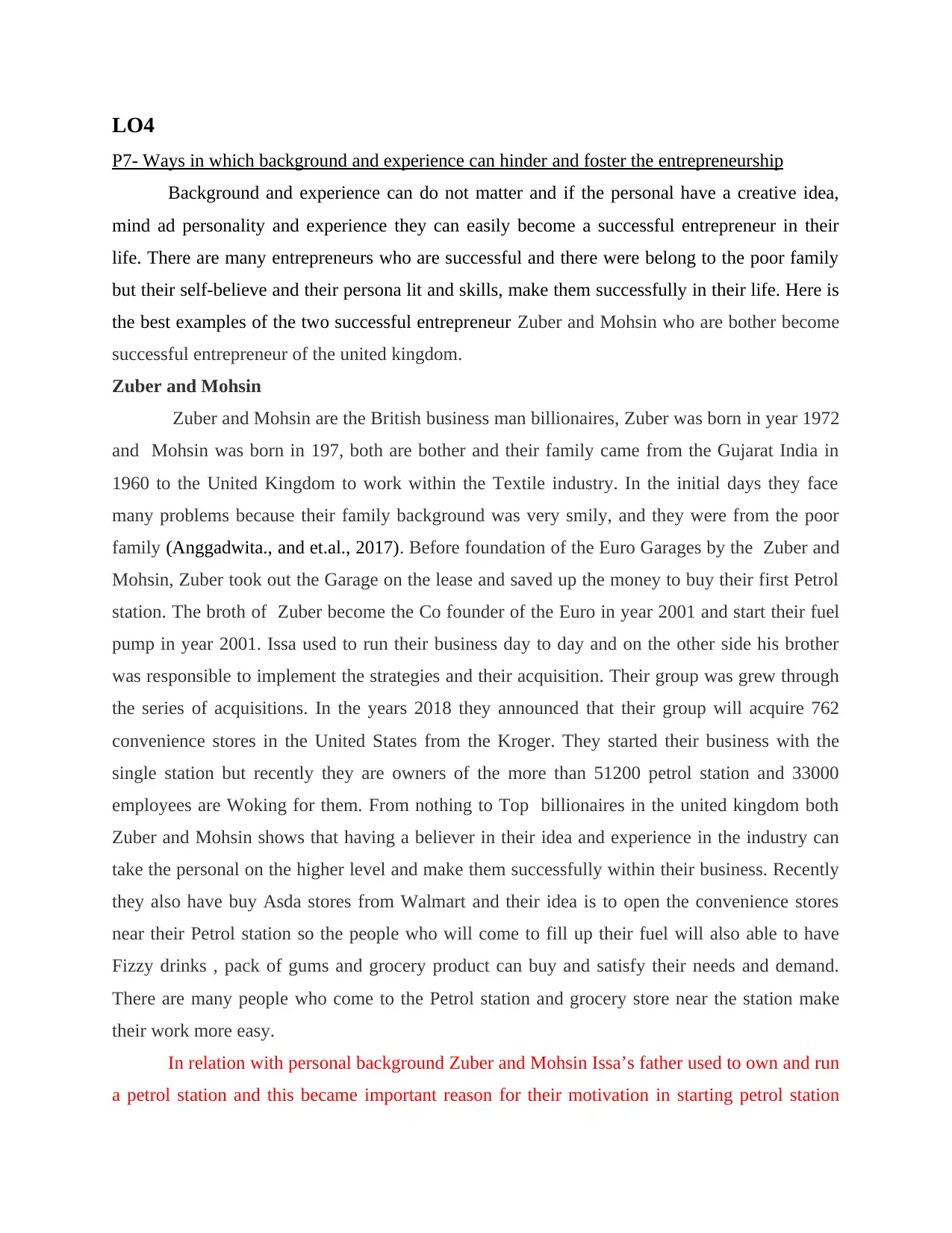
LO4
P7- Ways in which background and experience can hinder and foster the entrepreneurship
Background and experience can do not matter and if the personal have a creative idea,
mind ad personality and experience they can easily become a successful entrepreneur in their
life. There are many entrepreneurs who are successful and there were belong to the poor family
but their self-believe and their persona lit and skills, make them successfully in their life. Here is
the best examples of the two successful entrepreneur Zuber and Mohsin who are bother become
successful entrepreneur of the united kingdom.
Zuber and Mohsin
Zuber and Mohsin are the British business man billionaires, Zuber was born in year 1972
and Mohsin was born in 197, both are bother and their family came from the Gujarat India in
1960 to the United Kingdom to work within the Textile industry. In the initial days they face
many problems because their family background was very smily, and they were from the poor
family (Anggadwita., and et.al., 2017). Before foundation of the Euro Garages by the Zuber and
Mohsin, Zuber took out the Garage on the lease and saved up the money to buy their first Petrol
station. The broth of Zuber become the Co founder of the Euro in year 2001 and start their fuel
pump in year 2001. Issa used to run their business day to day and on the other side his brother
was responsible to implement the strategies and their acquisition. Their group was grew through
the series of acquisitions. In the years 2018 they announced that their group will acquire 762
convenience stores in the United States from the Kroger. They started their business with the
single station but recently they are owners of the more than 51200 petrol station and 33000
employees are Woking for them. From nothing to Top billionaires in the united kingdom both
Zuber and Mohsin shows that having a believer in their idea and experience in the industry can
take the personal on the higher level and make them successfully within their business. Recently
they also have buy Asda stores from Walmart and their idea is to open the convenience stores
near their Petrol station so the people who will come to fill up their fuel will also able to have
Fizzy drinks , pack of gums and grocery product can buy and satisfy their needs and demand.
There are many people who come to the Petrol station and grocery store near the station make
their work more easy.
In relation with personal background Zuber and Mohsin Issa’s father used to own and run
a petrol station and this became important reason for their motivation in starting petrol station
P7- Ways in which background and experience can hinder and foster the entrepreneurship
Background and experience can do not matter and if the personal have a creative idea,
mind ad personality and experience they can easily become a successful entrepreneur in their
life. There are many entrepreneurs who are successful and there were belong to the poor family
but their self-believe and their persona lit and skills, make them successfully in their life. Here is
the best examples of the two successful entrepreneur Zuber and Mohsin who are bother become
successful entrepreneur of the united kingdom.
Zuber and Mohsin
Zuber and Mohsin are the British business man billionaires, Zuber was born in year 1972
and Mohsin was born in 197, both are bother and their family came from the Gujarat India in
1960 to the United Kingdom to work within the Textile industry. In the initial days they face
many problems because their family background was very smily, and they were from the poor
family (Anggadwita., and et.al., 2017). Before foundation of the Euro Garages by the Zuber and
Mohsin, Zuber took out the Garage on the lease and saved up the money to buy their first Petrol
station. The broth of Zuber become the Co founder of the Euro in year 2001 and start their fuel
pump in year 2001. Issa used to run their business day to day and on the other side his brother
was responsible to implement the strategies and their acquisition. Their group was grew through
the series of acquisitions. In the years 2018 they announced that their group will acquire 762
convenience stores in the United States from the Kroger. They started their business with the
single station but recently they are owners of the more than 51200 petrol station and 33000
employees are Woking for them. From nothing to Top billionaires in the united kingdom both
Zuber and Mohsin shows that having a believer in their idea and experience in the industry can
take the personal on the higher level and make them successfully within their business. Recently
they also have buy Asda stores from Walmart and their idea is to open the convenience stores
near their Petrol station so the people who will come to fill up their fuel will also able to have
Fizzy drinks , pack of gums and grocery product can buy and satisfy their needs and demand.
There are many people who come to the Petrol station and grocery store near the station make
their work more easy.
In relation with personal background Zuber and Mohsin Issa’s father used to own and run
a petrol station and this became important reason for their motivation in starting petrol station
Paraphrase This Document
Need a fresh take? Get an instant paraphrase of this document with our AI Paraphraser
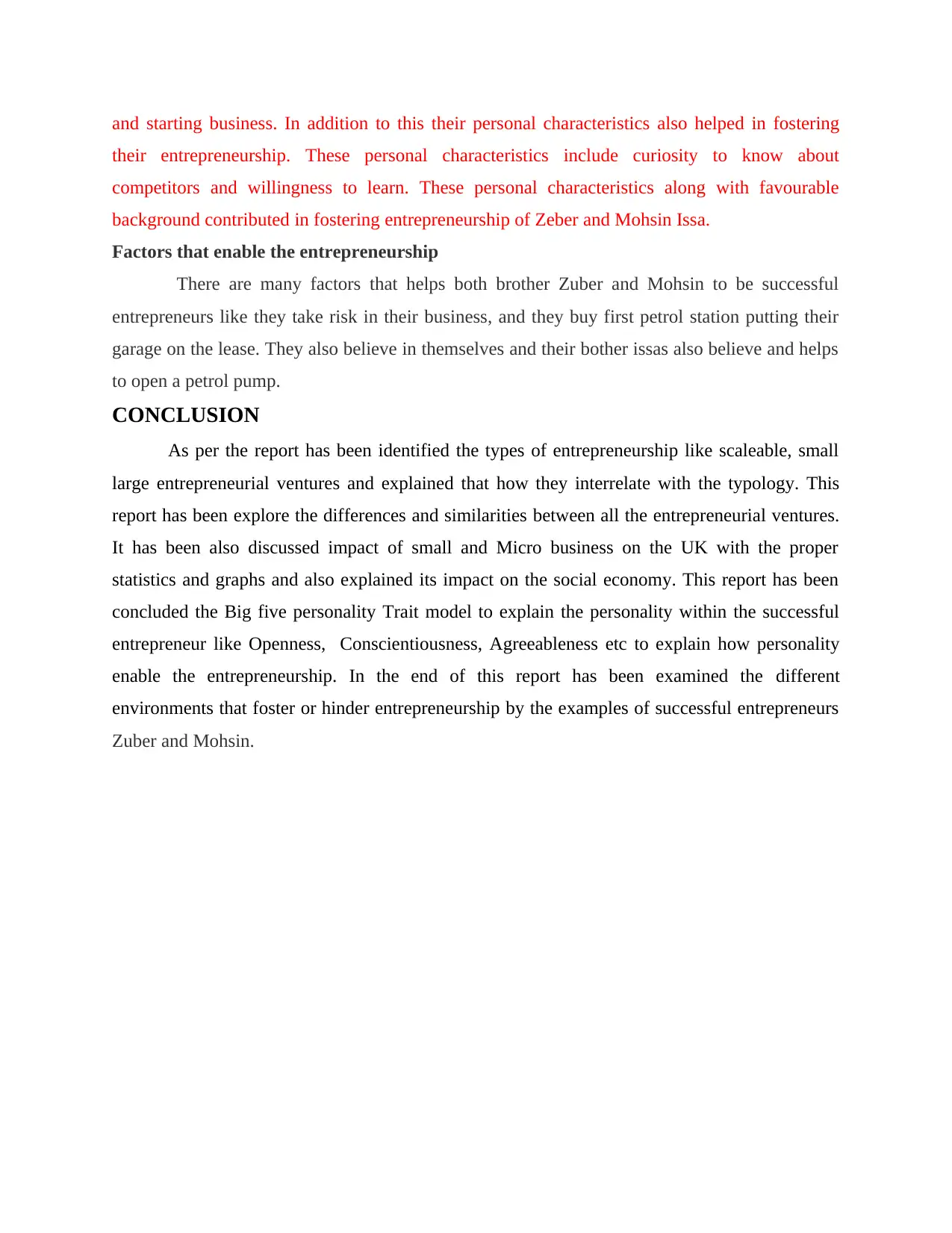
and starting business. In addition to this their personal characteristics also helped in fostering
their entrepreneurship. These personal characteristics include curiosity to know about
competitors and willingness to learn. These personal characteristics along with favourable
background contributed in fostering entrepreneurship of Zeber and Mohsin Issa.
Factors that enable the entrepreneurship
There are many factors that helps both brother Zuber and Mohsin to be successful
entrepreneurs like they take risk in their business, and they buy first petrol station putting their
garage on the lease. They also believe in themselves and their bother issas also believe and helps
to open a petrol pump.
CONCLUSION
As per the report has been identified the types of entrepreneurship like scaleable, small
large entrepreneurial ventures and explained that how they interrelate with the typology. This
report has been explore the differences and similarities between all the entrepreneurial ventures.
It has been also discussed impact of small and Micro business on the UK with the proper
statistics and graphs and also explained its impact on the social economy. This report has been
concluded the Big five personality Trait model to explain the personality within the successful
entrepreneur like Openness, Conscientiousness, Agreeableness etc to explain how personality
enable the entrepreneurship. In the end of this report has been examined the different
environments that foster or hinder entrepreneurship by the examples of successful entrepreneurs
Zuber and Mohsin.
their entrepreneurship. These personal characteristics include curiosity to know about
competitors and willingness to learn. These personal characteristics along with favourable
background contributed in fostering entrepreneurship of Zeber and Mohsin Issa.
Factors that enable the entrepreneurship
There are many factors that helps both brother Zuber and Mohsin to be successful
entrepreneurs like they take risk in their business, and they buy first petrol station putting their
garage on the lease. They also believe in themselves and their bother issas also believe and helps
to open a petrol pump.
CONCLUSION
As per the report has been identified the types of entrepreneurship like scaleable, small
large entrepreneurial ventures and explained that how they interrelate with the typology. This
report has been explore the differences and similarities between all the entrepreneurial ventures.
It has been also discussed impact of small and Micro business on the UK with the proper
statistics and graphs and also explained its impact on the social economy. This report has been
concluded the Big five personality Trait model to explain the personality within the successful
entrepreneur like Openness, Conscientiousness, Agreeableness etc to explain how personality
enable the entrepreneurship. In the end of this report has been examined the different
environments that foster or hinder entrepreneurship by the examples of successful entrepreneurs
Zuber and Mohsin.
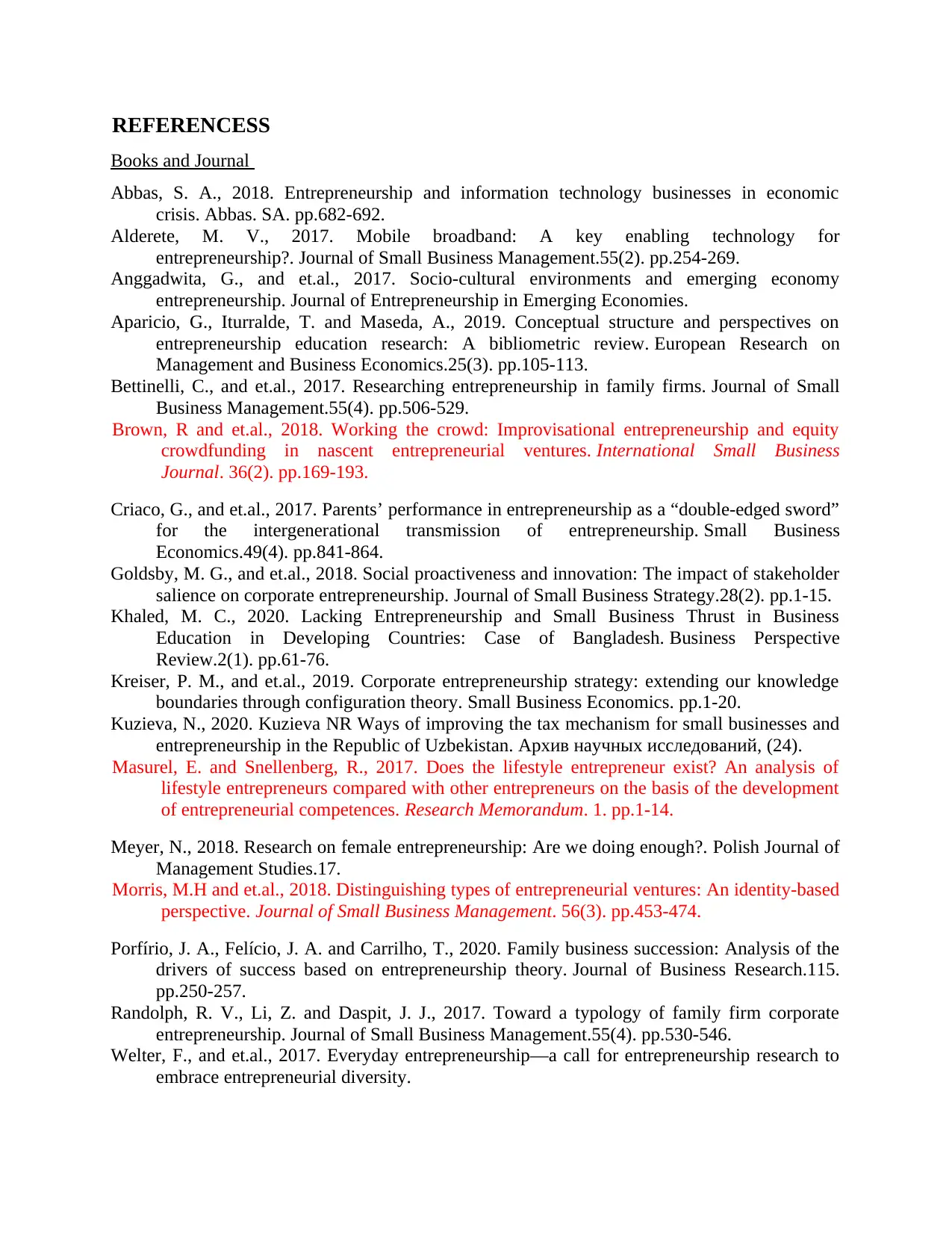
REFERENCESS
Books and Journal
Abbas, S. A., 2018. Entrepreneurship and information technology businesses in economic
crisis. Abbas. SA. pp.682-692.
Alderete, M. V., 2017. Mobile broadband: A key enabling technology for
entrepreneurship?. Journal of Small Business Management.55(2). pp.254-269.
Anggadwita, G., and et.al., 2017. Socio-cultural environments and emerging economy
entrepreneurship. Journal of Entrepreneurship in Emerging Economies.
Aparicio, G., Iturralde, T. and Maseda, A., 2019. Conceptual structure and perspectives on
entrepreneurship education research: A bibliometric review. European Research on
Management and Business Economics.25(3). pp.105-113.
Bettinelli, C., and et.al., 2017. Researching entrepreneurship in family firms. Journal of Small
Business Management.55(4). pp.506-529.
Brown, R and et.al., 2018. Working the crowd: Improvisational entrepreneurship and equity
crowdfunding in nascent entrepreneurial ventures. International Small Business
Journal. 36(2). pp.169-193.
Criaco, G., and et.al., 2017. Parents’ performance in entrepreneurship as a “double-edged sword”
for the intergenerational transmission of entrepreneurship. Small Business
Economics.49(4). pp.841-864.
Goldsby, M. G., and et.al., 2018. Social proactiveness and innovation: The impact of stakeholder
salience on corporate entrepreneurship. Journal of Small Business Strategy.28(2). pp.1-15.
Khaled, M. C., 2020. Lacking Entrepreneurship and Small Business Thrust in Business
Education in Developing Countries: Case of Bangladesh. Business Perspective
Review.2(1). pp.61-76.
Kreiser, P. M., and et.al., 2019. Corporate entrepreneurship strategy: extending our knowledge
boundaries through configuration theory. Small Business Economics. pp.1-20.
Kuzieva, N., 2020. Kuzieva NR Ways of improving the tax mechanism for small businesses and
entrepreneurship in the Republic of Uzbekistan. Архив научных исследований, (24).
Masurel, E. and Snellenberg, R., 2017. Does the lifestyle entrepreneur exist? An analysis of
lifestyle entrepreneurs compared with other entrepreneurs on the basis of the development
of entrepreneurial competences. Research Memorandum. 1. pp.1-14.
Meyer, N., 2018. Research on female entrepreneurship: Are we doing enough?. Polish Journal of
Management Studies.17.
Morris, M.H and et.al., 2018. Distinguishing types of entrepreneurial ventures: An identity‐based
perspective. Journal of Small Business Management. 56(3). pp.453-474.
Porfírio, J. A., Felício, J. A. and Carrilho, T., 2020. Family business succession: Analysis of the
drivers of success based on entrepreneurship theory. Journal of Business Research.115.
pp.250-257.
Randolph, R. V., Li, Z. and Daspit, J. J., 2017. Toward a typology of family firm corporate
entrepreneurship. Journal of Small Business Management.55(4). pp.530-546.
Welter, F., and et.al., 2017. Everyday entrepreneurship—a call for entrepreneurship research to
embrace entrepreneurial diversity.
Books and Journal
Abbas, S. A., 2018. Entrepreneurship and information technology businesses in economic
crisis. Abbas. SA. pp.682-692.
Alderete, M. V., 2017. Mobile broadband: A key enabling technology for
entrepreneurship?. Journal of Small Business Management.55(2). pp.254-269.
Anggadwita, G., and et.al., 2017. Socio-cultural environments and emerging economy
entrepreneurship. Journal of Entrepreneurship in Emerging Economies.
Aparicio, G., Iturralde, T. and Maseda, A., 2019. Conceptual structure and perspectives on
entrepreneurship education research: A bibliometric review. European Research on
Management and Business Economics.25(3). pp.105-113.
Bettinelli, C., and et.al., 2017. Researching entrepreneurship in family firms. Journal of Small
Business Management.55(4). pp.506-529.
Brown, R and et.al., 2018. Working the crowd: Improvisational entrepreneurship and equity
crowdfunding in nascent entrepreneurial ventures. International Small Business
Journal. 36(2). pp.169-193.
Criaco, G., and et.al., 2017. Parents’ performance in entrepreneurship as a “double-edged sword”
for the intergenerational transmission of entrepreneurship. Small Business
Economics.49(4). pp.841-864.
Goldsby, M. G., and et.al., 2018. Social proactiveness and innovation: The impact of stakeholder
salience on corporate entrepreneurship. Journal of Small Business Strategy.28(2). pp.1-15.
Khaled, M. C., 2020. Lacking Entrepreneurship and Small Business Thrust in Business
Education in Developing Countries: Case of Bangladesh. Business Perspective
Review.2(1). pp.61-76.
Kreiser, P. M., and et.al., 2019. Corporate entrepreneurship strategy: extending our knowledge
boundaries through configuration theory. Small Business Economics. pp.1-20.
Kuzieva, N., 2020. Kuzieva NR Ways of improving the tax mechanism for small businesses and
entrepreneurship in the Republic of Uzbekistan. Архив научных исследований, (24).
Masurel, E. and Snellenberg, R., 2017. Does the lifestyle entrepreneur exist? An analysis of
lifestyle entrepreneurs compared with other entrepreneurs on the basis of the development
of entrepreneurial competences. Research Memorandum. 1. pp.1-14.
Meyer, N., 2018. Research on female entrepreneurship: Are we doing enough?. Polish Journal of
Management Studies.17.
Morris, M.H and et.al., 2018. Distinguishing types of entrepreneurial ventures: An identity‐based
perspective. Journal of Small Business Management. 56(3). pp.453-474.
Porfírio, J. A., Felício, J. A. and Carrilho, T., 2020. Family business succession: Analysis of the
drivers of success based on entrepreneurship theory. Journal of Business Research.115.
pp.250-257.
Randolph, R. V., Li, Z. and Daspit, J. J., 2017. Toward a typology of family firm corporate
entrepreneurship. Journal of Small Business Management.55(4). pp.530-546.
Welter, F., and et.al., 2017. Everyday entrepreneurship—a call for entrepreneurship research to
embrace entrepreneurial diversity.

1 out of 16
Related Documents
Your All-in-One AI-Powered Toolkit for Academic Success.
+13062052269
info@desklib.com
Available 24*7 on WhatsApp / Email
![[object Object]](/_next/static/media/star-bottom.7253800d.svg)
Unlock your academic potential
© 2024 | Zucol Services PVT LTD | All rights reserved.





